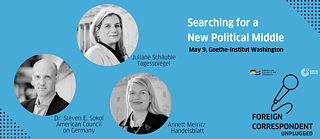![]()

The third episode of our series Foreign Correspondent Unplugged delves into current political debates on both sides of the Atlantic. German journalists Annett Meiritz and Juliane Schäuble talk about the upcoming elections in Europe and the United States — and how they are being perceived on the opposite side of the Atlantic. Dr. Steven E. Sokol, the President and CEO of the American Council on Germany, moderates. Listen on Spotify, Apple Podcasts, or wherever you get your podcasts.
With the U.S. Presidential and European Parliament elections in 2024, campaigning is heating up on both sides of the Atlantic. We are seeing increasing polarization and fragmentation of the political landscape — and even a calcification of positions. Yet, on both sides of the Atlantic, many candidates from the left and the right are trying to appeal to voters in the political middle in hopes of pulling votes from across party lines.
Speakers
Annett Meiritz is the U.S. Correspondent for Germany’s leading business, trade, and finance daily Handelsblatt. She covers the U.S. Administration and Congress, usually from an economic angle. Previously she worked as Parliamentary Correspondent for Germany’s leading news portal Spiegel Online, based in Berlin. She holds a B.A. degree in Modern History and Media Science and was educated to be a Journalist at the Berlin Journalism School.Juliane Schäuble is the U.S. Correspondent of Der Tagesspiegel, Berlin’s biggest newspaper. Before she moved to Washington, DC, in June 2018 she was the head of the political department of the paper where she was responsible for the front page and the political section. She has more than twelve years of experience in the business and the political department of Der Tagesspiegel.
Ms. Schäuble earned her Master’s in Political Science at the University in Potsdam, Germany. Her studies included one semester at American University in Washington, DC, where she took classes in American foreign policy and worked part-time for the American Council of Young Political Leaders (Washington Semester Program).
Dr. Steven E. Sokol is the President and CEO of the American Council on Germany. Previously, he served as President and CEO of the World Affairs Council of Pittsburgh and prior to that he was the Vice President and Director of Programs at the American Council on Germany. He holds a Doctorate in Law and Policy from Northeastern University as well as an M.A. in International Relations and International Economics from the Johns Hopkins University’s Paul Nitze School of Advanced International Studies (SAIS) and a B.A. from Wesleyan University. He has also studied at the Ruprecht-Karls-Universität in Heidelberg and as a Fulbright Scholar at the Freie Universität in Berlin. Dr. Sokol is a member of the Council on Foreign Relations and sits on several advisory boards. He was awarded a Bundesverdienstkreuz (Order of Merit) for his work to strengthen German-American relations.
